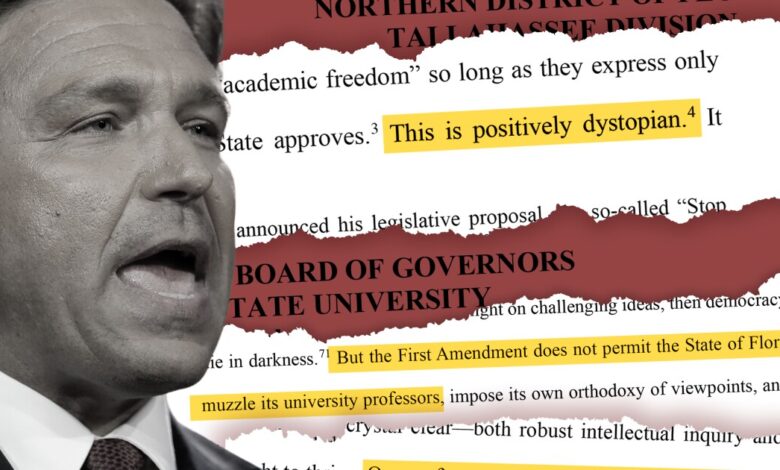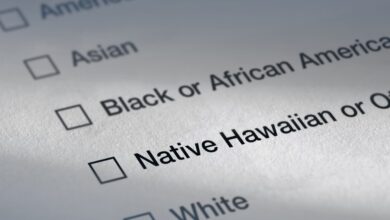Channeling Orwell, Judge Blasts Florida’s ‘Dystopian’ Ban on ‘Woke’ Instruction

[ad_1]
After his decisive victory in the Florida governor’s race last week, Ron DeSantis dubbed the Sunshine State as the place “where ‘woke’ goes to die.” But a federal judge on Thursday pushed back against that notion, blocking the State University System of Florida from enforcing through regulation a new law that puts strict limits on what professors can teach or say about race in the classroom.
In a searing 139-page order, Judge Mark E. Walker of the U.S. District Court for the Northern District of Florida cast as Orwellian the state’s defense of the Individual Freedom Act, also known as the “Stop WOKE” Act. The order comes in response to litigation from university professors and college students, who have argued that provisions of the law prohibiting the expression of certain viewpoints, such as those related to sex and race, are unconstitutional. Defending the law, the state has argued that public university professors do not have free speech rights when it comes to what they teach. In his order, Walker took strong exception to that argument.
“Defendants argue that, under this Act, professors enjoy ‘academic freedom’ so long as they express only those viewpoints of which the State approves,” Walker wrote. “This is positively dystopian.”
Walker, who was nominated to the bench in 2012 by President Barack Obama, is known for his rhetorical flourishes. In the opening line of his order, granting in part a preliminary injunction to the plaintiffs, the federal judge quoted from George Orwell’s 1984. “‘It was a bright cold day in April, and the clocks were striking thirteen,’” Walker wrote, “and the powers in charge of Florida’s public university system have declared the State has unfettered authority to muzzle its professors in the name of ‘freedom.’”
Under the Individual Freedom Act, professors are prohibited from “training or instruction that espouses, promotes, advances, inculcates, or compels … student[s] or employee[s] to believe” eight specified concepts. Among others, those concepts include promoting a belief that “A person, by virtue of his or her race, color, national origin, or sex is inherently racist, sexist, or oppressive, whether consciously or unconsciously.”
Florida’s law is part of a broader conservative pushback against “woke” liberalism and critical race theory in colleges and schools. DeSantis, who is widely expected to be a contender for the Republican presidential nomination in 2024, has made these issues central to his political identity. As governor, DeSantis is empowered to appoint most members of the state’s Board of Governors, the systemwide university governing body. Under the law, it falls to the board to ferret out unchecked “wokeness” and enforce prohibitions against it. (Violations of the law could result in forfeiture of performance-based funding from the state.)
Walker’s order, however, enjoins the board from enforcing its regulation. Jerry C. Edwards, a staff attorney for the American Civil Liberties Union of Florida, who represented some of the plaintiffs, said the order sent a strong signal to public colleges and the Legislature.
“We are very happy with this ruling,” he said. “Judge Walker enjoined the Florida Board of Governors from being able to enforce this law, which he called ‘positively dystopian.’ And we totally agree that it is positively dystopian, violates the First Amendment, and is unconstitutionally vague under the Fourteenth Amendment.”
A spokeswoman for the Board of Governors said in an email that the board had “no comment, as it is our policy not to comment on pending litigation.”
This is at least the second case this year in which Walker has written a strong order related to First Amendment issues at public universities. In January he issued a blistering order against the University of Florida, saying it could not enforce a policy that had blocked university professors from participating in litigation against the state.
Walker’s order on Thursday took strong umbrage at what the judge characterized as a troubling notion that the state can ban speech it does not like.
“Defendants respond that the First Amendment offers no protection here,” Walker wrote. “They argue that because university professors are public employees, they are simply the State’s mouthpieces in university classrooms. As a result, Defendants claim, the State has unfettered authority to limit what professors may say in class, even at the university level. According to Defendants, so long as professors work for the State, they must all read from the same music.”
Edwards, the ACLU lawyer, said Walker’s two orders signal a judicial check on efforts to encroach on professors’ speech rights. “What this ruling and the other ruling says is that the State of Florida has not been good about protecting free-speech rights on college campuses and promoting free speech on college campuses, and that the courts aren’t having it,” Edwards said. “They are pushing back and saying you need to respect the First Amendment. You need to respect academic freedom.”
[ad_2]
Source link






